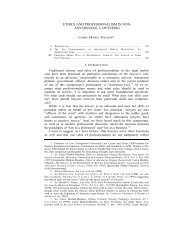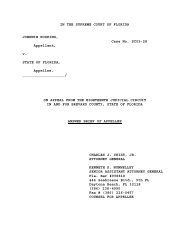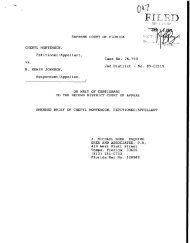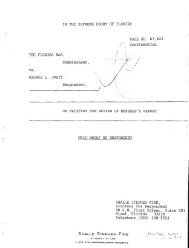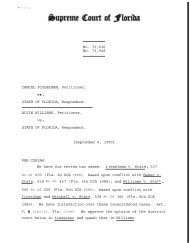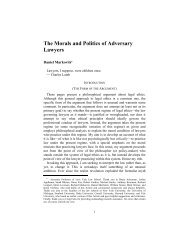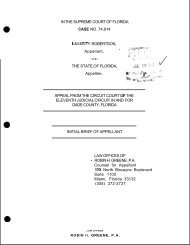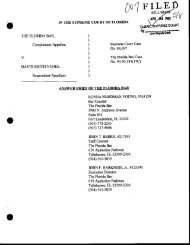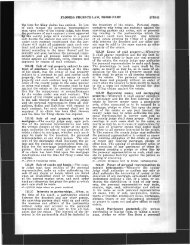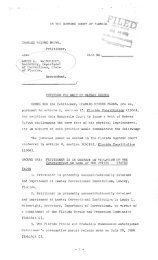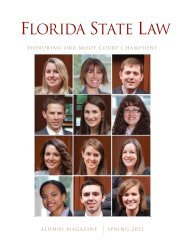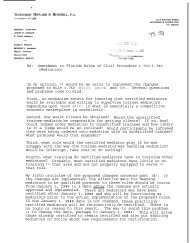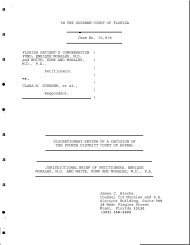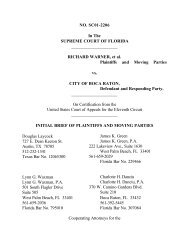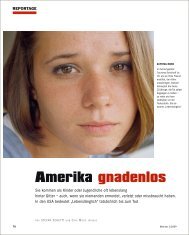Fla. Stat, (1981) - Florida State University College of Law
Fla. Stat, (1981) - Florida State University College of Law
Fla. Stat, (1981) - Florida State University College of Law
You also want an ePaper? Increase the reach of your titles
YUMPU automatically turns print PDFs into web optimized ePapers that Google loves.
defense. The prejudice is evident, The remedy is a new trial.<br />
Trim TRIAL COUHI: EmED IN l?EmaTrING THE<br />
P~EXXITOR M WCIT FROM DEFENSE WITNESS<br />
RICHARD ELWaD THAT TEE REMAINED<br />
SILENT AJSD DID NOT DISCUSS HIS CASE WIZILF, IN<br />
JAIL AWJTING TRIAL,, IN VIOL3TION OF THE FIETH,<br />
SIXTH, AND FOURTEE" AImmaNm To m u s.<br />
CONSTImON AND ARFICLE I, SECTIONS 9 AND 16<br />
OF 'IZIE: FLORIDA CONSTITUTION.<br />
Wing the cross-examination <strong>of</strong> defense witness Rihd Ell-, the<br />
prosecutor asked the witness what the defendant had told him, and elicited<br />
f m him the fact that the defendant did not assert his innocence while<br />
awaiting trial in the jail and that the defendant did not discuss his case at<br />
all. (T. 1787-1788). The prosecutor called attention to the fact that the<br />
defendant had said nothing, and that he had not asserted his innocence in talking<br />
to a fellow inmate <strong>of</strong> the jail while awaiting trial and inferred that an inncent<br />
pan muld not have said nothing. (21. 1787-1788).<br />
In Willinsky v. <strong>Stat</strong>e, 360 So. 2d 760 @la. 1978), this court discussed<br />
the right <strong>of</strong> an accused to be free flm feax <strong>of</strong> attack by the use <strong>of</strong> post-arrest<br />
Impeachmxlt by disclasure <strong>of</strong> the legitimate exercise<br />
<strong>of</strong> the right to sllence is a denial <strong>of</strong> due process.<br />
It should not be material at what stage the accused<br />
was silent so long as the right to silence is protected<br />
at that stage. The language in Dcryle v. Ohio, 426 U.S.<br />
610, 96 S. Ct. 2240, 49 L. Ed. 2d 91 (1976) and United<br />
<strong>Stat</strong>es v. - Hale, 422 U.S. 171, 95 S. Ct. 2133, 45 L. Ed.<br />
2d 99 (1975), although set in the context <strong>of</strong> silence at<br />
arrest, reflects a general policy. me essence <strong>of</strong> these<br />
holdings is that mchmnt by disclosure <strong>of</strong> the exercise<br />
<strong>of</strong> the right to silence is a denial <strong>of</strong> due process. The<br />
general terms used by the Supra Cburt <strong>of</strong> the Lhited<br />
<strong>Stat</strong>es are not limited to arrest, but apply at any stage<br />
where the right to silence is protected. Bid., at 762.<br />
The defendant's right to ramin silent had clearly attached where he<br />
was an inmate <strong>of</strong> the jail awaiting trial.<br />
His refusal to discuss his case with<br />
other inmates, or even his silence in the face <strong>of</strong> accusation by an inmate, has<br />
Page -60-



